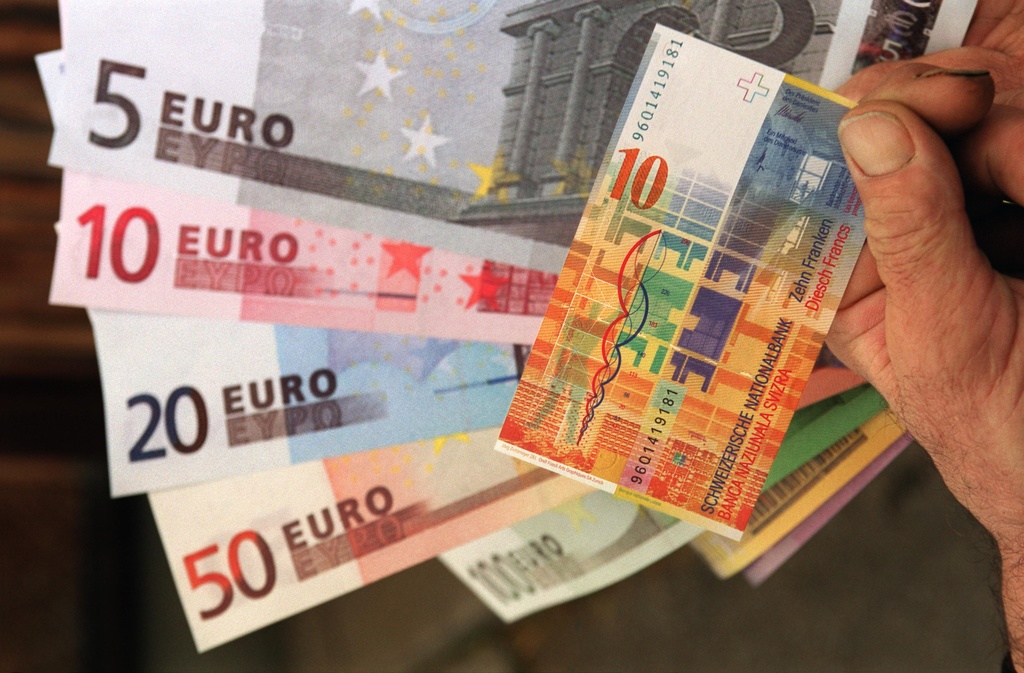Swiss economy sails steadily through the storm

The waning fortunes of the euro have given the jitters to many European countries but the Swiss economy is holding up, despite a strong Swiss franc.
Switzerland is benefiting more from the global economy than other parts of Europe, economist Jan-Egbert Sturm tells swissinfo.ch.
Sturm, who is head of the KOF Swiss Economic Institute in Zurich, argues that intervention from the Swiss National Bank is also playing a role to keep the franc from appreciating too much.
Swiss exporters have complained that the high value of the franc is hurting them. However, figures show Swiss exports made significant gains in the first quarter of the year.
The euro’s recent slide in value as well as the decision this week by rating agency Standard and Poor’s to downgrade Greece, Portugal and Spain have made both markets and investors nervous.
Against this background the euro has been hovering at around SFr1.43 ($1.32) for a number of days.
swissinfo.ch: To what extent is the value of the franc a sign that the Swiss National Bank has been acting on the market and watching the situation closely?
Jan-Egbert Sturm: It has continuously repeated that it would not allow a swift appreciation of the Swiss franc. Given the current situation with respect to Greece… there is some suspicion that the Swiss National Bank is presently active. Unfortunately we don’t really know because the data the Swiss National Bank provides is always released with a delay of one month. These are monthly figures, so we can never exactly work out whether or not it has been that active.
swissinfo.ch: When you say active, what can the national bank do exactly?
J-E.S.: The basic principle is that it buys up euros and provides additional Swiss francs and in that way puts a depreciation pressure on the Swiss franc which might counter the potential appreciation.
swissinfo.ch: Will a weakening of the euro have a significant impact on Swiss exports and the economic recovery, in particular?
J-E.S.: I think what is more important here is the economic condition of Europe. Of course if the price of Swiss goods goes up via an appreciation of the franc it’s not going to be beneficial for the trading sector. But we must also realise that the Swiss export sector normally produces niche products that are very specialised, where we know that the price elasticity is quite low, and that means that if there is an upward pressure on the Swiss franc, this would not immediately have a large consequence on the demand for Swiss products.
What’s more serious is if the European economy falls back into something like a recession or a stagnation phase. Due to this lack of demand the Swiss export sector would be hurt and that’s probably more critical than the exchange rate appreciation.
swissinfo.ch: How far would you say that the Swiss franc is still a safe haven, particularly against European currencies?
J-E.S.: We’re never quite sure about this but probably the major reasons for the current upward pressure on the Swiss franc are the problems surrounding Greece. This is, in that sense, a safe haven effect. People are unsure about what these problems will do to the euro and therefore they leave the euro and go into other currencies, among them the Swiss franc.
swissinfo.ch: There have been a number of attacks against Switzerland’s tax system and banking secrecy. But people still like to park their money here, don’t they?
J-E.S.: Yes. The Swiss economy has a very large financial sector and we have over a long period of time built up a very good reputation. Of course, the problems over tax and banking secrecy give the Swiss financial sector a negative connotation.
On the other hand, and as we are currently witnessing, the core element of a strong Swiss financial sector is still alive.
swissinfo.ch: To what extent is Switzerland weathering the present storm better than others?
J-E.S.: Within Europe as a whole, Switzerland is indeed performing better than many other countries. One of the reasons is that we are benefitting quite a lot from the current upswing which we see in Asia and in the emerging markets in general. Switzerland is exporting a relatively large amount, at least compared with other European countries, and in that sense we do benefit somewhat more from the world economy than [other] Europeans.
It’s partly our structure. If you look at, for instance, the watch industry we are currently again seeing quite a substantial growth rate in exports. The watches are not being exported as much to Europe. They’re going to Asia – to those regions where we currently see a clear upswing in growth rates. The people there are benefiting to such an extent that they are again demanding these kinds of luxury products.
Robert Brookes, swissinfo.ch
Rating agency Standard and Poor’s downgraded both Greece and Portugal on Tuesday, April 27.
S&P cut Spain’s rating on Thursday in a sign the European deficit crisis was spreading.
Analysts have said that because Spain is a considerably larger economy than Greece and Portugal, any worsening of its credit worthiness could create bigger headaches for the euro zone.
However, S&P says Spain’s downgrade in no way put into question its ability to meet its debt obligations.
Both exports and imports were up – for the first time since autumn 2008.
Exports made significant gains, despite the strong franc, with the watch an metallurgical industries each exporting about a third more.
The balance of trade showed a SFr5.7 billion surplus.
Demand for Swiss exports rose in all continents, with the greatest increase from countries in Oceania and Asia.

In compliance with the JTI standards
More: SWI swissinfo.ch certified by the Journalism Trust Initiative











You can find an overview of ongoing debates with our journalists here . Please join us!
If you want to start a conversation about a topic raised in this article or want to report factual errors, email us at english@swissinfo.ch.